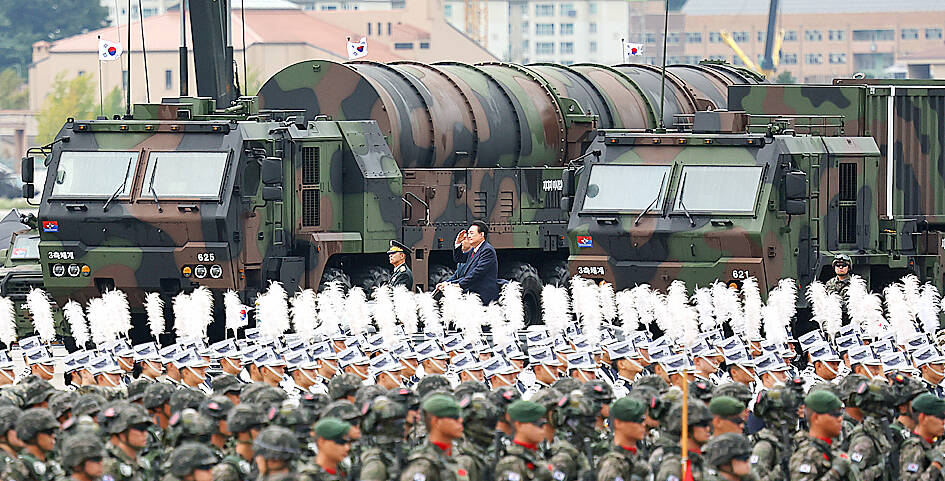South Korea yesterday unveiled its most powerful ballistic missile and other weapons that could target North Korea during a massive Armed Forces Day ceremony, as the South’s president warned the North’s regime would collapse if it attempts to use nuclear weapons.
South Korea’s weapons displays and warning against the North came after its northern rival recently raised regional animosities by disclosing its uranium-enrichment facility and tested missiles ahead of the US presidential election in November.
“If North Korea attempts to use nuclear weapons, it will face the resolute and overwhelming response of our military and the [South Korea]-US alliance,” South Korean President Yoon Suk-yeol told thousands of troops gathered at a military airport near Seoul. “That day will be the end of the North Korean regime.”

Photo: EPA-EFE
“The North Korean regime must abandon the delusion that nuclear weapons will protect them,” Yoon said.
The South Korean military displayed about 340 military equipment and weapons systems. Among them was its most powerful Hyunmoo-5 ballistic missile, which observers say is capable of carrying an 8-ton conventional warhead that can penetrate deep into the earth and destroy underground bunkers in North Korea.
It was the first time for South Korea to disclose that missile.
The US flew a long-range B-1B bomber during the ceremony in an apparent demonstration of its security commitment to its Asian ally. South Korea also flew some of its most advanced fighter jets.
Later yesterday, South Korea paraded its troops and weapons through the streets of Seoul, as part of efforts to boost military morale and demonstrate its deterrence capabilities against potential North Korean aggressions.

FREEDOM OF NAVIGATION: The UK would continue to reinforce ties with Taiwan ‘in a wide range of areas’ as a part of a ‘strong unofficial relationship,’ a paper said The UK plans to conduct more freedom of navigation operations in the Taiwan Strait and the South China Sea, British Secretary of State for Foreign, Commonwealth and Development Affairs David Lammy told the British House of Commons on Tuesday. British Member of Parliament Desmond Swayne said that the Royal Navy’s HMS Spey had passed through the Taiwan Strait “in pursuit of vital international freedom of navigation in the South China Sea.” Swayne asked Lammy whether he agreed that it was “proper and lawful” to do so, and if the UK would continue to carry out similar operations. Lammy replied “yes” to both questions. The

‘OF COURSE A COUNTRY’: The president outlined that Taiwan has all the necessary features of a nation, including citizens, land, government and sovereignty President William Lai (賴清德) discussed the meaning of “nation” during a speech in New Taipei City last night, emphasizing that Taiwan is a country as he condemned China’s misinterpretation of UN Resolution 2758. The speech was the first in a series of 10 that Lai is scheduled to give across Taiwan. It is the responsibility of Taiwanese citizens to stand united to defend their national sovereignty, democracy, liberty, way of life and the future of the next generation, Lai said. This is the most important legacy the people of this era could pass on to future generations, he said. Lai went on to discuss

AMENDMENT: Climate change is expected to increase the frequency of high-temperature days, affecting economic productivity and public health, experts said The Central Weather Administration (CWA) is considering amending the Meteorological Act (氣象法) to classify “high temperatures” as “hazardous weather,” providing a legal basis for work or school closures due to extreme heat. CWA Administrator Lu Kuo-chen (呂國臣) yesterday said the agency plans to submit the proposed amendments to the Executive Yuan for review in the fourth quarter this year. The CWA has been monitoring high-temperature trends for an extended period, and the agency contributes scientific data to the recently established High Temperature Response Alliance led by the Ministry of Environment, Lu said. The data include temperature, humidity, radiation intensity and ambient wind,

SECOND SPEECH: All political parties should work together to defend democracy, protect Taiwan and resist the CCP, despite their differences, the president said President William Lai (賴清德) yesterday discussed how pro-Taiwan and pro-Republic of China (ROC) groups can agree to maintain solidarity on the issue of protecting Taiwan and resisting the Chinese Communist Party (CCP). The talk, delivered last night at Taoyuan’s Hakka Youth Association, was the second in a series of 10 that Lai is scheduled to give across Taiwan. Citing Taiwanese democracy pioneer Chiang Wei-shui’s (蔣渭水) slogan that solidarity brings strength, Lai said it was a call for political parties to find consensus amid disagreements on behalf of bettering the nation. All political parties should work together to defend democracy, protect Taiwan and resist